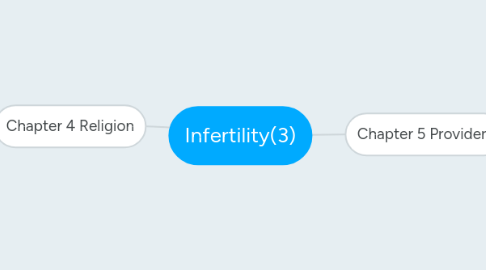
1. Chapter 5 Providers
1.1. NRT Epidemic
1.1.1. Dr.Yehia represents new face of egyptian NRT
1.1.2. Egypt's booming NRTs at the turn of 21st century to sophisticated consumers is a result of choice
1.1.3. Many of Egypts new centers offer low quality service like many of the third world countries, thanks to competition in private medical sector
1.2. Private IVF providers
1.2.1. Three well established IVF centers in Cairo
1.2.2. Doctors with success draw large number of patients to the centers, and even other doctors who are also infertile
1.2.3. Patients show up for a dependency relationships, hope, or for a doctors clinical skills
1.3. Quality of care: Patients' perspectives
1.3.1. Doctors giving" interpersonal competence" marked by caring concern and compassion to patients
1.3.2. Patients feel that there's an importance of the doctor-patient relationship
1.3.3. Patients care deeply whether they can trust the IVF physician can carry out the procedure in a morally acceptable fashion
1.3.4. Egyptian IVF providers need an increase on their interpersonal skills and quality of patient care
1.4. Quality of care: Physicians' perspectives
1.4.1. Industry wide problems in Egypt including lack of supplies, staff shortage, and dependency upon Western experts
1.4.2. need for strategically located IVF centers
1.4.3. Problems of local infrastructure and lack of nationwide regulatory system to monitor clinic operations
2. Chapter 4 Religion
2.1. Dalia and Galal
2.1.1. Galal became infertile after first marriage
2.1.2. Dalia married Galal(first cousin) even though family insisted not to because of his infertility
2.1.3. They seek help in the U.S. and denied donor sperm/eggs because of their religion, and therefore had IVF trials
2.1.4. After going back to Egypt and seeking ICSI they were successful in having a daughter
2.2. Reproductive medicine/Religious morality
2.2.1. Religion restricts how test-tube babies are made in Egypt
2.2.2. Religion in Egypt reduces technological options available and couples willing to use new technologies
2.2.3. Those who undergo IVF or ICSI practices view it as a moral problem
2.3. Fatwas and "official" Islam
2.3.1. Islam characterized as "encompassing" or "comprehensive" religion, giving daily activities
2.3.2. Fatwa- nonbinding religious opinion
2.3.3. New basic guidelines for conception; no third parties, no surrogacy, any egg/sperm from husband or wife is ok
2.4. Contemplating Immoralities
2.4.1. Egyptians perceive themselves as morally superior to the Christians(West)
2.4.2. Egyptians appalled at the adoption, surrogates, sperm banks in the West
